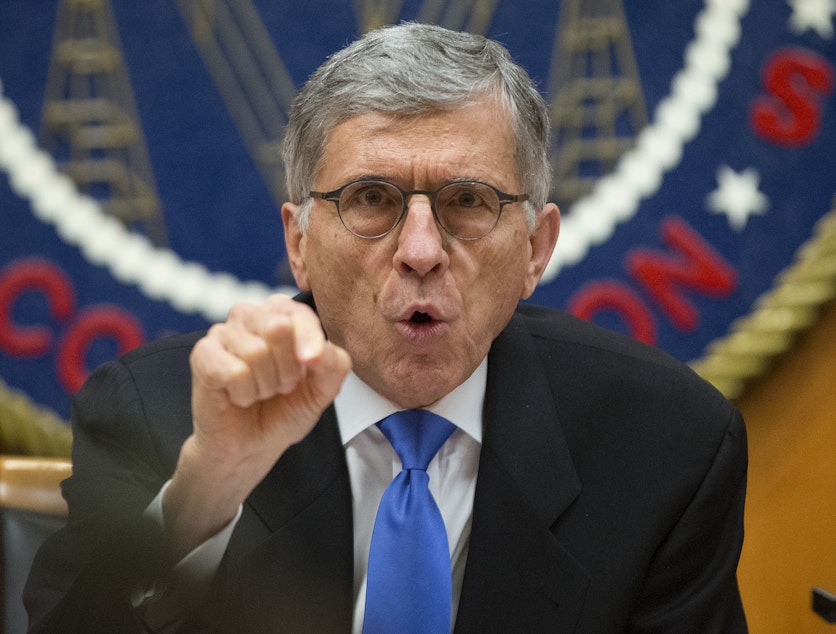Who Loses, Who Wins In FCC's Net Neutrality Ruling?

Today, the Federal Communications Commission approved net neutrality in a 3-2 vote. That means that Internet service providers, which includes cable companies like Comcast, can’t selectively slow down Internet data speeds in favor of paid fast lanes.
So what does that mean for consumers and companies in the Seattle area?
KUOW's Bill Radke asked Hanson Hosein, director of the Communication Leadership program at the University of Washington and president of HRH Media Group.
Transcript edited for brevity.
Radke: Who wins in the Seattle area?
Sponsored
Hosein: Basically anybody who uses the Internet as their business model where they have content that travels over the Internet wins. So if you look at the big companies that supported this – Facebook, Google, Twitter, Netflix – you know they want their content to travel freely; they want people to have access to it. And so here in Seattle you're looking at any company that specializes in content.
I would like to think that Microsoft would support this because of how they use Skype and how Xbox content takes advantage of this ruling, but I can't say for sure. I believe that Amazon also would benefit because they rely so heavily on how people interact on the Internet to do retail trade.
Radke: But wouldn't the giant Amazons and Microsofts be the ones who could afford to, and want to, pay for these fast lanes?
Hosein: Well the whole point to the FCC decision was really to benefit two constituents. First, they want more Microsofts and Amazons, so they want entrepreneurs to see the Internet as a place they can do business without having to pay some kind of extra fee.
Secondly, they want consumers to benefit. There's been great market failure because we've had these monopolies like Comcast that don't give us the service we want, which is why there's been so much public pressure.
Sponsored
Amazon is a consumer company first and foremost, and they want the consumers to have access to them and be happy, and that's why I think they would support this.
Radke: Who loses in the Seattle area?
Hosein: Anybody who has a business model of traffic, who provides the infrastructure for the traffic. I'm curious to see what CenturyLink, for example, is going to say about this.
T-Mobile is caught in the net of this decision because mobile providers are being treated like cable, which is amazing because in the past they've said that they’re different because it's a much more constrained environment: People sip data and are charged for it, as opposed to “all you can eat.” And so it will be very interesting to see how T-Mobile and CenturyLink behave based on this.
Radke: So why would the traffic providers lose?
Sponsored
Hosein: This is the problem: There has not actually been any harm done so far on any of this stuff. It's very theoretical to say that CenturyLink may in the future want to charge more, or may want to slow traffic down, or say “no BitTorrents through our infrastructure.” This ruling will prevent them from doing any of that.
Radke: The city of Seattle is looking at creating an Internet utility. How does this ruling affect that plan?
Hosein: I think it actually gives it more support. Americans are upset about how they're being treated by these monopolies, and they want more options. There's a lot of support right now for alternative sources whether it is municipal broadband or, say, Google Fiber.
Municipal broadband, especially, has gotten a lot of resistance from Comcast because they say they shouldn't be competing with the government for something that should be in the private sector. Well now the FCC’s ruling gives municipalities support.
Radke: So bottom line, if I'm an average consumer, how do I feel about this FCC decision?
Sponsored
Hosein: Bottom line, it has zero impact on you right now. In the future: I think it's not a bad thing because it is a wake up call for these monopoly companies like Comcast that have not treated us well – that gouge us, that give a slow speeds. We're going to come for you and figure this out differently if you don't help us out.
The reason why this is such a big deal is that most of the Internet traffic today is video consumption. A good third of broadband use is to consume Netflix. There’s a lot of expensive infrastructure that goes into streaming video.
So the question is whether this concept of net neutrality, which came about before video, can apply as universally as we want it to. It's great in theory, but we may need to deal with this in a way that we haven't seen yet from the FCC, and there will be huge challenges at the court level in next few years.

